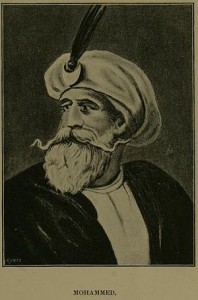
 Muhammad ibn ‘Abdullāh (Arabic: ﷴ; Transliteration: Muḥammad; also spelled Muhammed or Mohammed) (ca. 570/571 – June 8, 632), is considered the founder of the religion of Islam, and is regarded by Muslims as a messenger and prophet of God, the last law-bearer in a series of Islamic prophets, and, by most Muslims, the last prophet of Islam as taught by the Qur’an. Muslims thus consider him the restorer of an uncorrupted original monotheistic faith (islām) of Adam, Noah, Abraham, Moses, Jesus and other prophets. He was also active as a diplomat, merchant, philosopher, orator, legislator, reformer, military general, and, according to Muslim belief, an agent of divine action.
Muhammad ibn ‘Abdullāh (Arabic: ﷴ; Transliteration: Muḥammad; also spelled Muhammed or Mohammed) (ca. 570/571 – June 8, 632), is considered the founder of the religion of Islam, and is regarded by Muslims as a messenger and prophet of God, the last law-bearer in a series of Islamic prophets, and, by most Muslims, the last prophet of Islam as taught by the Qur’an. Muslims thus consider him the restorer of an uncorrupted original monotheistic faith (islām) of Adam, Noah, Abraham, Moses, Jesus and other prophets. He was also active as a diplomat, merchant, philosopher, orator, legislator, reformer, military general, and, according to Muslim belief, an agent of divine action.
Born in 570 in the Arabian city of Mecca, he was orphaned at an early age and brought up under the care of his uncle Abu Talib. He later worked mostly as a merchant, as well as a shepherd, and was first married by age 25. Discontented with life in Mecca, he retreated to a cave in the surrounding mountains for meditation and reflection. According to Islamic beliefs it was here, at age 40, in the month of Ramadan, where he received his first revelation from God. Three years after this event Muhammad started preaching these revelations publicly, proclaiming that “God is One”, that complete “surrender” to Him (lit. islām) is the only way acceptable to God, and that he himself was a prophet and messenger of God, in the same vein as other Islamic prophets.
See below for some of Muhammad’s notes Quotes (Wisdom):
“He is not strong and powerful who throweth people down; but he is strong who witholdeth himself from anger”
“One hour’s meditation on the work of the Creator is better than seventy years of prayer”
“Be in the world like a traveler, or like a passer on, and reckon yourself as of the dead”
“Do not say, that if the people do good to us, we will do good to them; and if the people oppress us, we will oppress them; but determine that if people do you good, you will do good to them; and if they oppress you, you will not oppress them”
“If a man finds himself with bread in both hands, he should exchange one loaf for some flowers of the narcissus, because the loaf feeds the body, but the the flowers feed the soul”
Wikipedia contributors. “Muhammad.” Wikipedia, The Free Encyclopedia. Wikipedia, The Free Encyclopedia, 11 Feb. 2011. Web. 12 Feb. 2011.
Related articles
- Islam: Theology, Quran, and History (brighthub.com)
- The Birth of Prophet Muhammad (pbuh) (brighthub.com)
- Prophet Muhammed(saw) is the most influential man in history (xeniagreekmuslimah.wordpress.com)
- Muhammad in the World Scriptures (brighthub.com)
- Islam: History and Beliefs (brighthub.com)

Leave a Reply
Want to join the discussion?Feel free to contribute!